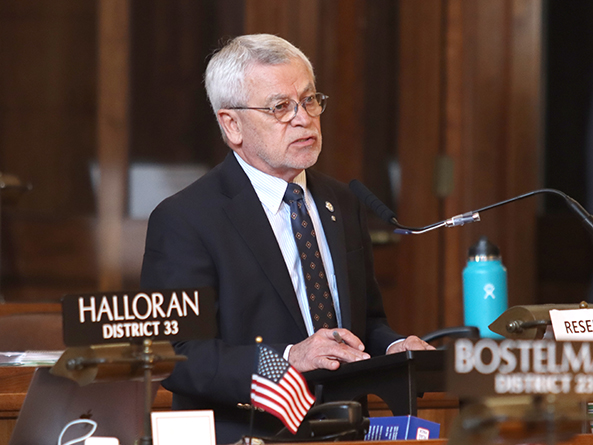Session Review: Agriculture
The Agriculture Committee advanced measures this session intended to increase consumer access to E-15, simplify the permitting process for food trucks and allow more beginning farmers and ranchers to qualify for state tax benefits.
LB562, introduced by Adams Sen. Myron Dorn and passed on a vote of 46-0, requires motor fuel retail dealers in Nebraska to advertise and sell E-15 from at least 50 percent of their qualifying dispensers if they build a new retail motor fuel site or replace more than 80 percent of the motor fuel storage and dispensing infrastructure at an existing site, beginning in 2024.
Small retail motor fuel sites are exempt from the requirement if they file a statement with the state Department of Agriculture.
If the 2027 statewide ethanol blend rate — the average percentage of ethanol contained in each gallon of motor fuel sold — is below 14 percent, the bill requires retail dealers to advertise and sell E-15 from at least one qualifying dispenser at each site, unless the site qualifies for certain exemptions, beginning in 2028.
LB562 also increases a state income tax credit for retail dealers from 5 cents to 8 cents for each gallon of E-15 sold during 2024. The credit will be 9 cents per gallon in 2025, 8 cents per gallon in 2026, 7 cents per gallon in 2027 and 5 cents per gallon in 2028. The annual limit on credits increases from $4 million to $5 million for those years.
As amended, LB562 includes provisions of LB116, introduced by Sen. Tom Brandt of Plymouth.
Among other changes, the bill repeals a minimum acreage requirement and extends the deadline for applications under the Beginning Farmer Tax Credit Act from Dec. 31, 2025, to Dec. 31, 2027. The act provides tax exemptions and credits for beginning farmers and livestock producers and for owners of certain agricultural assets who rent those assets to them.
Under LB562, a farmer or livestock producer qualifies for the program if they have a net worth of no more than $750,000, an increase from $200,000. They also must be of legal age to enter into and be legally responsible for a binding contract or lease.
In addition, the bill requires the Beginning Farmer Board to exclude any pension, retirement or other deferred benefit accounts owned by a beginning farmer or livestock producer, or a spouse or dependent, when determining net worth.
The measure caps the amount of refundable state income tax credits granted to owners of agricultural assets at $2 million per year.
Also included in LB562 are provisions of LB740, introduced by Omaha Sen. Tony Vargas. They allow a political subdivision acting as a regulatory authority to enter into an interlocal agreement with other public agencies to grant and provide reciprocity for local licensing of food trucks.
The measure also requires first and second class cities to participate in a registry to be maintained by the state Department of Agriculture that records the municipal ordinances regulating food trucks.
Cities that do not regulate food trucks are required to submit a statement to that effect for publication on the registry.
The department will make the registry available to the public on its website and create a guidance document for food truck operators that describes applicable permit requirements.
A bill that would further restrict nuisance lawsuits under the Nebraska Right to Farm Act did not advance from committee.
Under LB662, sponsored by Sen. Beau Ballard of Lincoln, no person could file a nuisance action against a Nebraska agricultural operation unless:
• the person owns a majority interest in the real property affected by the agricultural operation and the property is located within one-half mile of the agricultural operation; and
• the agricultural operation has “materially violated” an applicable federal, state or local law.
Among other changes, the bill also would shorten the time that a property owner could file a nuisance lawsuit from two years to one.


